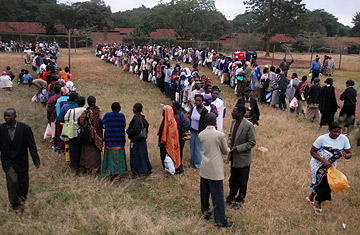
A large crowd of residents of the Kibera slum in Nairobi line up at a local school to receive personal food staple rations, January 15, 2008
Kenya has long been a haven for refugees flooding in from neighboring unstable countries such as Somalia and Sudan. Now political chaos in east Africa's biggest economy is forcing thousands westward into Uganda — and the number of Kenyan refugees has yet to peak.
More than 6,000 Kenyans have fled since last month's disputed presidential elections erupted into violence. For more than two weeks, Kenyan towns have suffered mass riots and looting, more than 600 people have been killed and a qaurter of a million have been uprooted. The refugees bring horror stories of torched homes, murdered family members and bloodthirsty mobs. Ethnic clashes between the tribes loyal to incumbent President Mwai Kibaki, a Kikuyu, and opposition leader Raila Odinga, a Luo, have been a particularly ugly aspect of the post-poll conflict. Ugandan authorities say they have been forced to separate refugees by tribe due to simmering tensions.
Kikuyus have suffered the brunt of ethnic-targeted violence. In Nairobi's sprawling slums and northern towns in the lush Rift Valley, reports abound of Kenyan Kikuyus being stopped at roadblocks by drunken gangs of Luo and Kalenjin tribesmen to be beaten or killed.
"We don't put tribes together in the camps because they have extended their conflicts into Uganda," said Bimpabaza Hashaka, the top government official in the eastern Ugandan district Tororo. Hashaka said youth gangs of the Kalenjin tribe have repeatedly threatened attacks on Kikuyus, even going as far as to try to poison the food being prepared for Kikuyu refugees sheltering in a church. Hospital emergency rooms in Tororo have also been the site of further fighting between men of differing tribes. Refugees poured in this week as the Kenyan opposition waged three days of rallies in all parts of the country. Says Hashaka: "They keep on coming, saying their homes have been burnt."
The number of refugees is expected to rise as the political tumult continues in Kenya. Nairobi's slum Mathare could have passed for a war zone on Thursday. Ambulances roared through trash-littered streets, as hundreds of protestors faced off with police. Between makeshift roadblocks, residents dodged flying stones, tear gas and live bullets. "We are after peace, but only peace with solidarity!" shouted a young man armed with a machete. Behind him, the streets teemed with crowds of people and abandoned bullet-scarred shacks. But voicing the opinion of many violence-weary Kenyans, Pamela Atieno complained of the riots: "You go out to buy food and get teargassed."
The United Nations World Food Programme says that the timeline for when the Kenyan refugees will return home is highly uncertain. The agency has started distributing food along the Uganda-Kenya border. Kenya's opposition announced Friday that it would switch to economic protests and boycotts next week, but refugees seeking shelter are still expected to flock to Uganda. It is an unusual situation for Uganda, which still has millions of its own citizens displaced due to a brutal 20-year civil war. The conflict between Lord's Resistance Army rebels and the Ugandan government only ended in July 2006. Nevertheless, says Hashaka of the refugees from Kenya: "They think they're safer here than where they're coming from."
